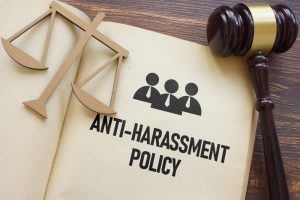How California’s Anti-Harassment Laws Protect Employees in the Workplace


FEHA Sets the Standard in California
California’s Fair Employment and Housing Act (FEHA) outlaws harassment or discrimination on more than a dozen protected grounds—sex, gender identity, sexual orientation, race, color, national origin, disability, religion, marital status, medical condition, military or veteran status, genetic information, and age.
Government Code § 12940 goes further than federal law by requiring every employer—whether a boutique five-person design studio or a global manufacturer—to “take all reasonable steps” to prevent unlawful conduct. That duty drives proactive measures such as clear complaint channels, prompt investigations, and discipline of offenders. For workers, the rule turns everyday slights—unwanted advances, mockery of a mobility aid, or “old-timer” cracks at colleagues over forty—into actionable claims of age discrimination in California.
The Civil Rights Department (CRD) enforces FEHA and can prosecute employers directly, seek systemic injunctions, and recover monetary relief; Assembly Bill 3281, passed in 2024, clarified the agency’s authority to litigate under federal age-bias statutes as well. Private litigants also thrive: well-publicized age discrimination cases in California such as Reid v. Google, Inc. illustrates how a single director labeled “obsolete” and “slow” secured a California Supreme Court ruling that hostile “stray remarks” may prove bias.
Remedies under FEHA include back pay, emotional-distress damages, punitive awards, and prevailing-plaintiff attorneys’ fees—leverage that a seasoned employee discrimination lawyer wields to drive settlement. For employers, the statute offers an affirmative defense only if they show (1) reasonable prevention policies and (2) that the worker unreasonably failed to use them, a high bar that underscores the value of periodic compliance audits guided by a California employment lawyer.
Mandatory Policies and Training—No Longer Optional
Since January 1, 2021, California employers with five or more workers must maintain a written anti-harassment policy, distribute it in every language commonly used at the worksite, and deliver interactive prevention training: one hour for rank-and-file staff and two hours for supervisors every two years—or within six months of hire or promotion.
The curriculum must explain prohibited conduct, complaint procedures, supervisory responsibilities, and available legal remedies. The state’s own modules, hosted free on the CRD website, remove cost excuses, and completion certificates satisfy record-keeping rules.
Failure to comply carries several risks. First, the Labor Commissioner or CRD may assess civil penalties; second, non-compliance practically eliminates an employer’s chance to assert the “reasonable steps” defense in court; and third, juries often view missing training records as evidence of indifference.
For that reason, small businesses as well as household-name corporations increasingly outsource compliance audits to employment lawyers in San Diego, California to verify that policy language mirrors FEHA regulations and integrates whistleblower protections.
Training also produces measurable business gains. A CRD-commissioned study found companies that adopted robust, scenario-based programs saw a 40 percent reduction in harassment complaints within three years. Lower complaint volume means fewer internal disruptions, reduced turnover, and stronger brand reputation—a return on investment that resonates with the C-suite.
Employees benefit, too. A clear policy spells out how to report misconduct without fear and assures workers that retaliation violates the same statute. If an employer fails to provide training or ignores a complaint, a work discrimination lawyer can introduce that lapse as evidence of “malice or reckless indifference,” opening the door to punitive damages.
The “Silenced No More” Act
California first curbed secrecy with the 2019 Stand Together Against Non-Disclosure Act, barring clauses that hid sexual-harassment settlements. Senate Bill 331—the “Silenced No More” Act—took effect on January 1, 2022, and widened that shield to every form of workplace discrimination, harassment, or retaliation covered by FEHA.
Today, any agreement—whether a new-hire NDA, severance package, or settlement—that tries to gag a worker from talking about, for example, disability bias or racial slurs is void unless it includes bold statutory language affirming the right to disclose unlawful conduct.
The statute also protects current employees who refuse to sign overbroad confidentiality terms: firing or demoting them constitutes retaliation, adding another FEHA violation. Significantly, SB 331 obligates employers offering severance to inform departing staff of their right to consult counsel.
For victims, the law changes settlement dynamics. Companies can still keep dollar figures private, yet workers remain free to discuss facts—creating public accountability that deters repeat offenses. This openness helped expose high-profile harassment claims in the tech sector and encouraged others to step forward.
Employers can safeguard proprietary information by carving out trade-secret provisions while allowing disclosure of unlawful acts. Drafting that balance demands precision; one stray clause could nullify the entire agreement. Firms that rely on template NDAs drafted before 2022 risk unenforceable contracts and statutory penalties. If your employer threatens discipline for speaking about discrimination, consult an employee discrimination lawyer immediately.
How We Build Winning Cases
John P. Martin, Attorney at Law handles each strategy session personally, leveraging more than a decade of courtroom experience as a harassment lawyer in San Diego. When harassment strikes, decisive representation can end the abuse and secure fair compensation. John P. Martin, Attorney at Law offers the diligent, personal advocacy San Diego workers and businesses deserve. Contact us today or call 619-807-5299 to schedule a confidential consultation.





